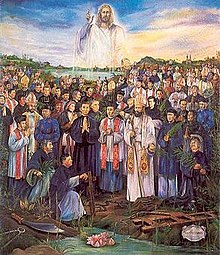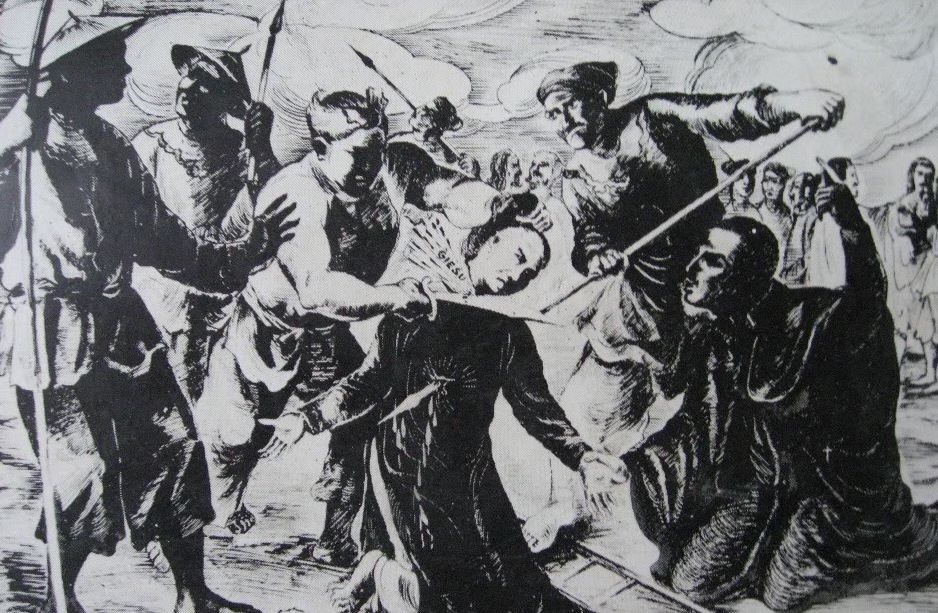Servants of God John Baptist Messari and Francis Mary Bucherelli, SJ
Servant of God JOHN BAPTIST MESSARI, SJ
Born: August 12, 1673
Died: June 15, 1723
Servant of God FRANCIS MARY BUCHERELLI, SJ
Born: May 21, 1686
Died: October 11, 1723
 The Jesuits presence in Tonkin, present day northern Vietnam, began when the first mission led by Fr Alexander de Rhodes SJ arrived there in 1624. By 1658 he had successfully converted 300,000 Vietnamese. Conversions continued to increase during the mission’s first century despite sporadic persecutions in 1659, 1695 and 1721. It was during the 1721 persecution that the Society had its first Vietnam martyrs, Frs Baptist Messari and Francis Mary Bucherelli
The Jesuits presence in Tonkin, present day northern Vietnam, began when the first mission led by Fr Alexander de Rhodes SJ arrived there in 1624. By 1658 he had successfully converted 300,000 Vietnamese. Conversions continued to increase during the mission’s first century despite sporadic persecutions in 1659, 1695 and 1721. It was during the 1721 persecution that the Society had its first Vietnam martyrs, Frs Baptist Messari and Francis Mary Bucherelli
John Baptist Messari was born in Gorizia, now part of Italy. He entered the Society in 1701 in Vienna, after being ordained as a diocesan priest. In 1706, he sailed for the Indies and arrived at Macau the following year and began missionary work in China’s southern provinces. He first went to Tonkin in 1712 but his work came to an end when he was accused before the regional governor, a Chinese apostate Christian of pouring “death waters” on the heads of dying children. He was condemned to death but was later released on condition he leave the territory because a bonz warned the governor that if he did not release Fr Messari, he would lose favour with the king of Cochin China at whose court the Jesuit Juan Arnedo enjoyed great favour. Fr Messari left for Macau in 1714 but returned to Tonkin in 1715. In a letter he wrote that year he described his mission work as being vast, taking care of some 14,000 Christians. He worked tirelessly and conversions were plentiful until the 1721 persecution.
Francis Mary Bucherelli was born in Tuscany, in Empoli, Italy. He studied with the Jesuits in Florence and entered the Society in 1700 with the desire of one day serving in foreign missions. He studied at the Roman College and while a student of theology he received word of his appointment to India and given two days to prepare for the voyage. He left Rome at the end of 1713 and stopped at Sienna to visit his younger brother, Luigi, also a Jesuit, before sailing off from Lisbon, Portugal in 1714. He arrived in Goa, India where he completed his theology and was ordained. He went on the Tonkin mission in 1716 and in a letter to his brother Luigi a year later he described that he lived on a boat which served as both his home and church. In that manner he traveled throughout his mission ministering to the faithful. With the coming of persecution, mission stations were destroyed, Christians were arrested and the missionaries were forced to go underground, living in harsh conditions, without food and rest, continually eluding police and spies. To ensure their safety, the Jesuit superior in China ordered Frs Bucherelli and Messari to leave for Macau in 1722 and while they were near the Chinese border in Lofeu, they were arrested together with three of their catechists.

The two priests and the catechists with chains on their feet were taken to Ketcho (today’s Hanoi) where they were interrogated by a tribunal of mandarins. When they were asked to tread upon a crucifix, the five knelt down and kissed it instead and thus the two Jesuits were found guilty of preaching a religion forbidden in the kingdom and the catechists for following its way and assisting its spread. They were punished by having more chains put on them and imprisoned in a cage-like alcove under the watchful eyes of guards. After six months of such harsh living and with only one cup of rice daily and living in a restricted cage placed under the hot sun, the two priests became seriously ill from weakness and maltreatment. Fr Messari died on June 15, 1723 because of severe dysentery.
As the mandarin was afraid of the king after the death of Fr Messari, he ordered a physician to come and attend to Fr Bucherelli. He remained in prison for another four months during which time other Tonkinese Christians were brought in. On the pretext that it was by the king’s order, the nine Christians including the five catechists, were led to the royal palace on the morning of October 11, 1723. There the mandarin appeared and read out their sentence. To Fr Bucherelli, he said: “You foreigner, because you have preached your religion which is prohibited in this realm, His Highness has condemned you to be beheaded.” To the Christians, he said: “Because you have followed Christ’s teachings, His Highness orders you to be beheaded and that your heads be fixed on posts for three days.”
On the way to the place of execution, Fr Bucherelli spoke to the Christians: “Brothers, be courageous, we will shortly see each other in heaven.” One of the catechists then intoned the litany to Our Lady and the entire journey was taken up with sacred songs. When they reached the place of martyrdom, their chains were removed and they knelt down before being beheaded. Other Christians who witnessed their deaths claimed their bodies. They buried Fr Bucherelli’s body separately from his other nine brethren who were put in a common grave.
